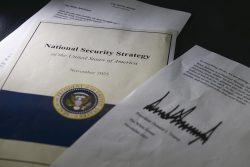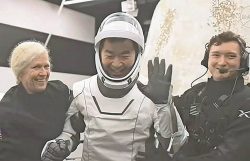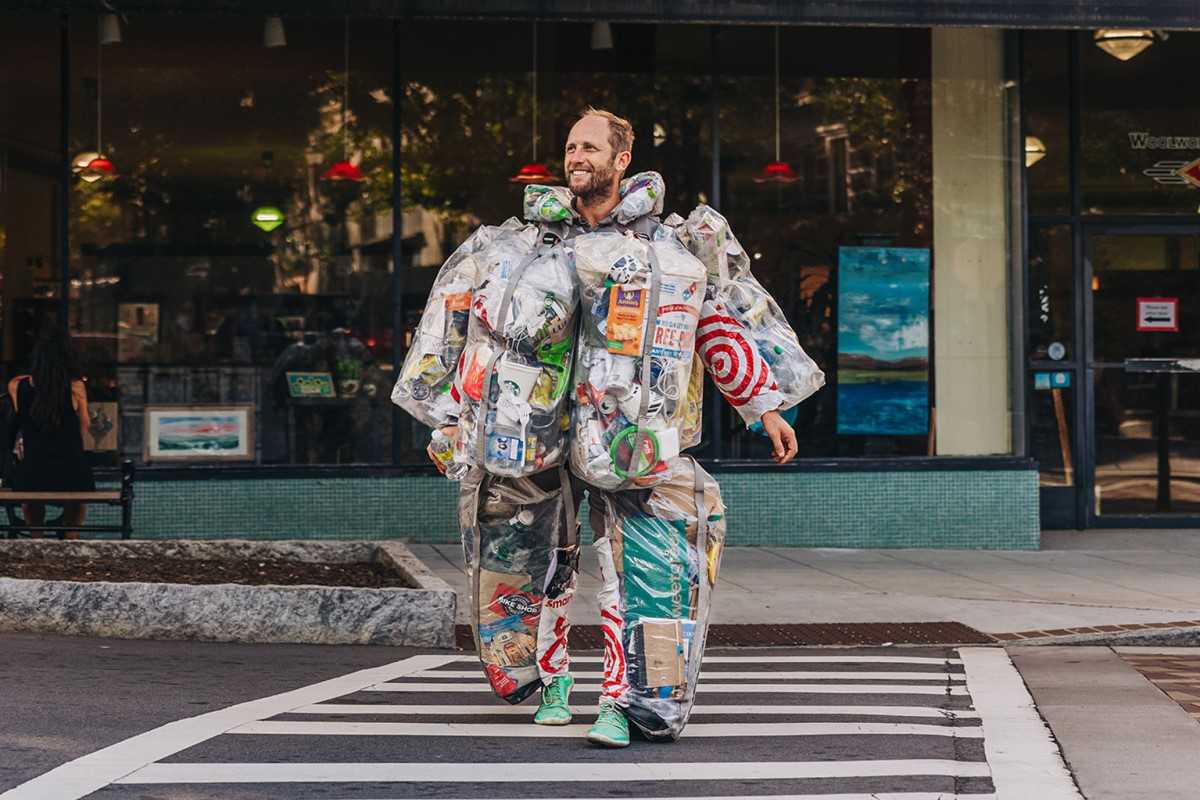
Robin Greenfield participated in the 30 Days of Wearing My Trash challenge in Los Angeles in 2022.
15:11 JST, July 19, 2023
Robin Greenfield once dreamed of becoming a millionaire by 30. Now, at 36, he voluntarily lives on less than $11,000 per year, eats mostly foraged and locally grown food and lives in a small dwelling that he built himself. He’s part of a larger movement of “zero-waste activism,” which includes those who strive to eliminate trash altogether, as well as people who maintain a more typical lifestyle but limit the amount they consume. For Greenfield, it’s meant changing nearly every aspect of his lifestyle.
“If the person I was 10 years ago went on a walk with me today, they would be flabbergasted,” he says.
On a Zoom call from his tiny home in Asheville, N.C., Greenfield explains how he finds edible plants, stepping outside to break off a few leaves of clover and wild lettuce for a snack. His efforts to spread awareness about larger environmental issues have earned him a sizable following. His income comes from traveling around the country – by bus or hitching a ride, as he doesn’t own a car – to speak. He has also undertaken extreme projects, including a recent initiative to support people growing their own toilet paper.
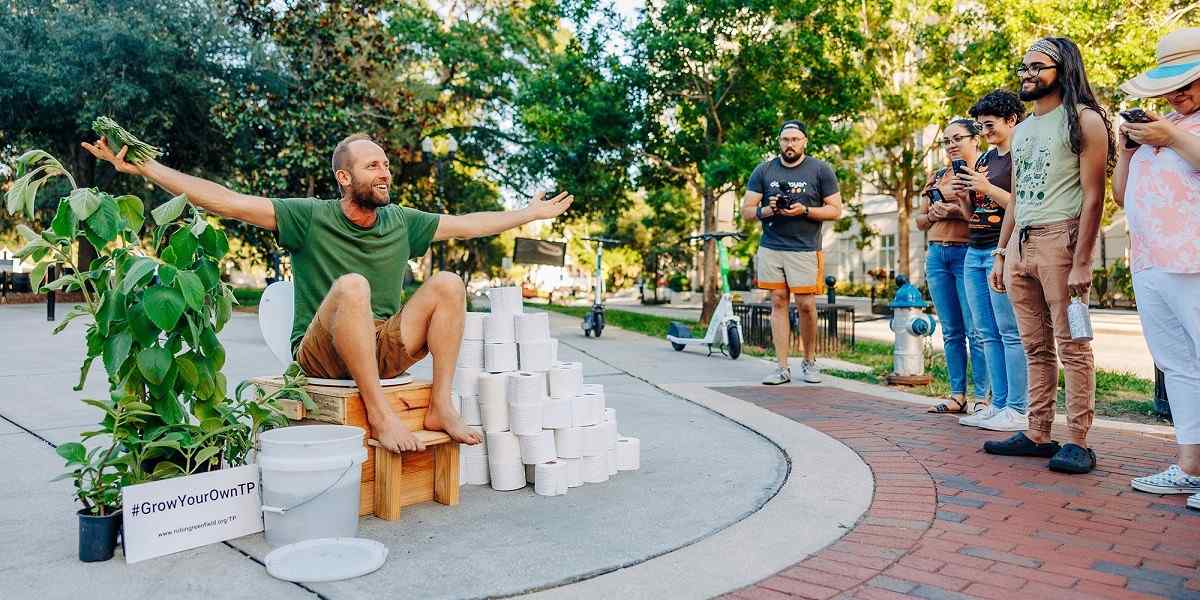
The Grow Your Own Toilet Paper Initiative encourages people to grow the toilet paper plant (blue spur flower) as an alternative to store-bought toilet paper.
The concept of zero waste has gained popularity in the past decade, fueled in part by social media. But it has also garnered criticism for requiring a level of privilege to adopt (creating less trash is tough if, say, you don’t have access to eco-friendly products or composting, you don’t live near a refill store or you don’t have time to make food from scratch). Some say that it puts the onus of environmental change on individuals, rather than corporations and policymakers. Still, those who identify as zero waste find it deeply fulfilling and believe it is a moral imperative to at least try to reduce your trash.
Eve Schaub, a 52-year-old writer in Pawlet, Vt., conducted an experiment with her husband and two teenage daughters in 2020, trying to go an entire year without throwing anything away. The project, which she wrote about in “Year of No Garbage: Recycling Lies, Plastic Problems, and One Woman’s Trashy Journey to Zero Waste,” made her realize how seldom plastic is recycled, and how harmful it is to the ecosystem and to human health.
“We’ve been sold this bill of goods that if we all just recycle, everything will be fine,” she says. “That’s a lie. Plastic is very hard for the recycling plants to process. Plus, you have to add new chemicals when you do. It’s this Frankenstein material that does not break down and does not go away.”
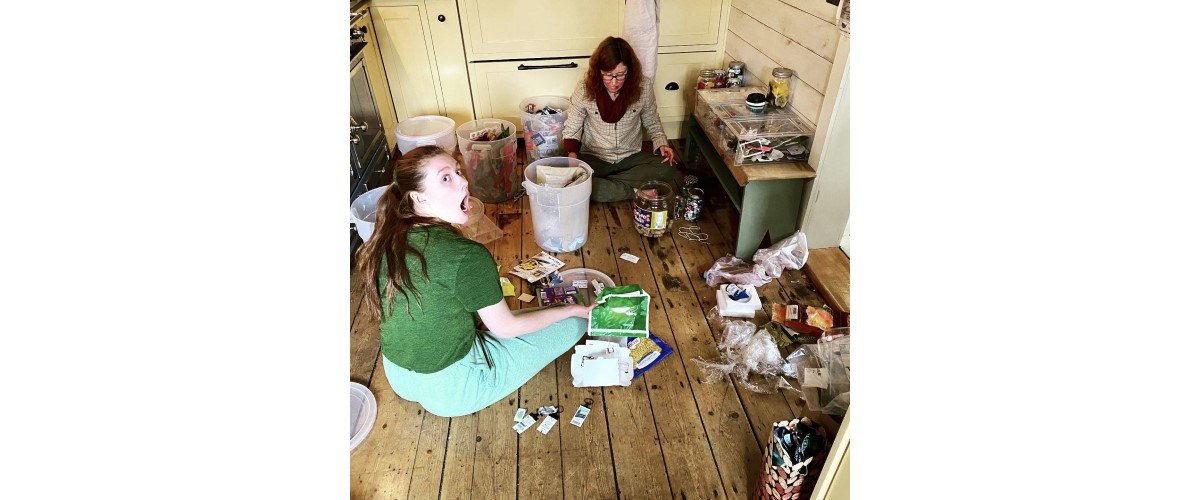
Eve and Ilsa Schaub sort waste items.
That’s not to say Schaub has sworn off recycling. Rather, a major focus of the book and her family’s lifestyle is avoiding products made of or packaged in single-use plastic. They’ve largely succeeded. In the past, the family produced 96 gallons of trash per week. During 2020, they produced almost none (the exception was “health and safety” items such as feminine hygiene products and Band-Aids). These days they produce nine gallons of trash per week, which they take, along with their recycling, to a local waste transfer station. While products with reusable or recyclable packaging can cost more, the change has saved them money in other ways. Canceling their waste pickup service, for instance, put $65 back in their monthly budget.
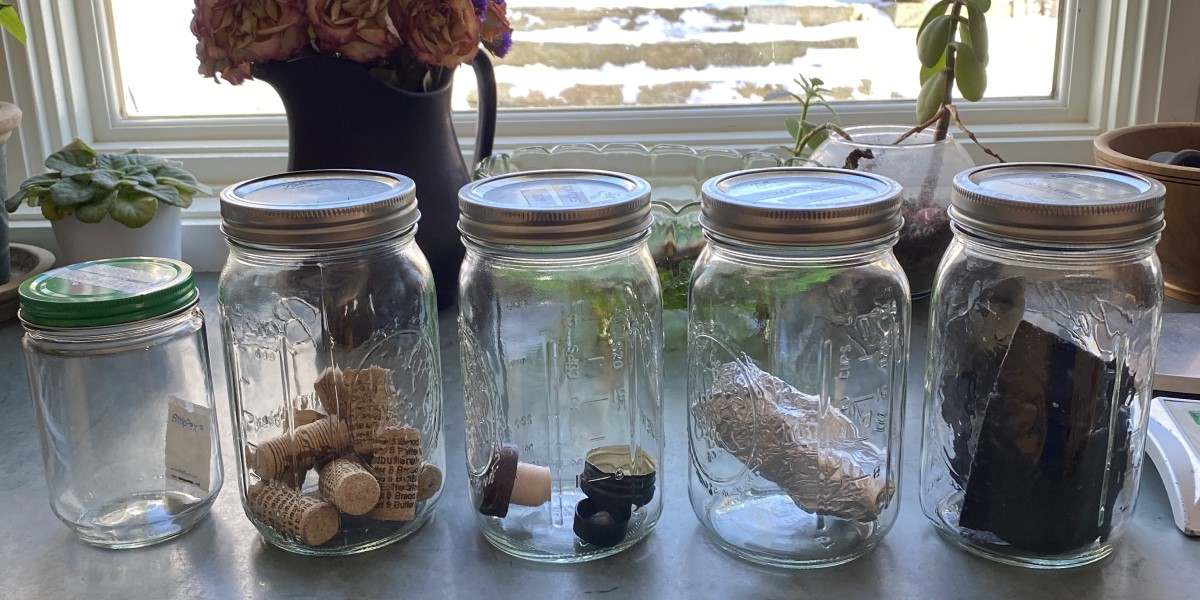
Eve Schaub conducted an experiment with her family in 2020, trying to go an entire year without throwing anything away.
April Dickinson, a 39-year-old communications specialist in Spokane, Wash., who lives with her husband and children, ages 7 and 11, takes a more flexible approach. Her family still has a waste pickup service, but they downgraded to the smallest size bin. She became interested in zero waste in 2016, inspired by popular figures like Bea Johnson, who became famous for fitting a year’s worth of trash into a small jar. But Dickinson found such strict goals untenable.
“I just knew that it wasn’t realistic for my family,” she says.
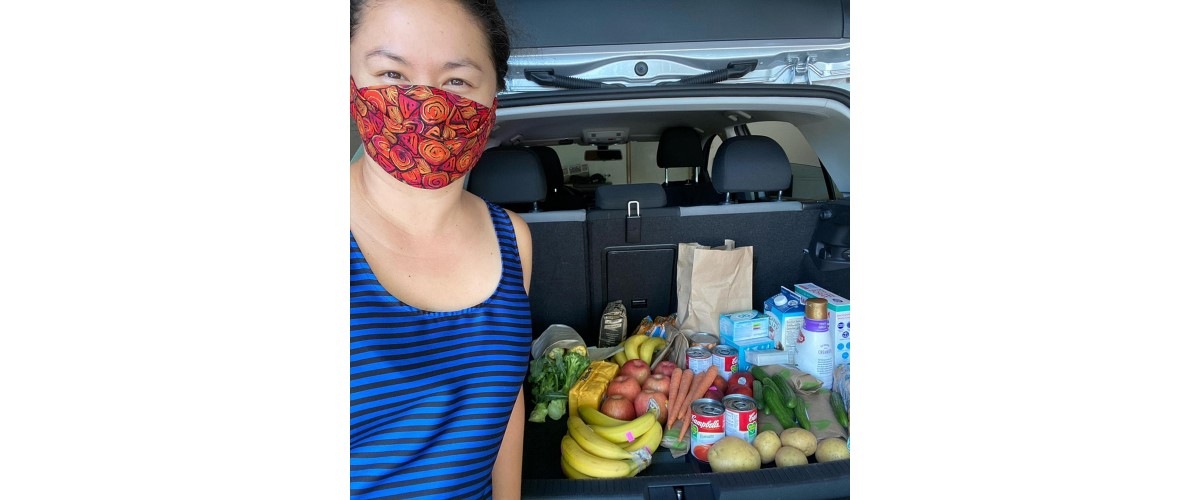
April Dickinson places groceries directly in her trunk if she forgets her reusable bags.
By identifying as the “sole zero waster in a family of four” on social media, she believes she contributes to the diversity of the movement by showing that you don’t have to be “all or nothing.” Her family members have shifted many of their habits alongside her. She buys most of their clothes secondhand, hasn’t shopped on Amazon for years and strives to minimize their use of water and other resources.
“Here in the Spokane Valley, people water their lawns every day and really seem to believe that there’s an endless amount of water in the region,” she says. “It’s a little scary. So one of the choices that I worked with my husband to make is to dramatically reduce the amount of grass that we have in our yard, and to replace that with native plants and drought-tolerant plants.”
Eliminating food waste requires eating differently from the typical American. Greenfield went a year without grocery shopping, growing and foraging hundreds of foods. Schaub and Dickinson still shop for food, but bring reusable bags, buy in bulk when possible and look for products in recyclable packaging.
“Sometimes it’s a very clear choice,” says Schaub. “Like, I could buy the ketchup in the plastic bottle, which is not going to get recycled, or I could buy it in the glass bottle, which will.”
Living in a rural area allows Schaub’s family access to options like buying milk in a reusable bottle from a local dairy and getting meat from a butcher where she can take her own containers. But many snack foods are off the table.
“It’s virtually impossible to buy potato chips that aren’t in single-use plastic,” Schaub says. The upside is that it pushes her family to eat a healthier diet.
Dickinson had a similar experience. “I used to buy those individual packets of cheese, plus a pack of shredded cheese, plus a bag of sliced cheese,” she says. “One of the shifts that I made was realizing that all I actually need is one block of cheese.”
The change made shopping cheaper and easier. “It would maybe take me longer to cut or shred, but letting go of that convenience factor was one of those first shifts of thinking, zero waste actually simplifies your patterns.”
Cleaning and personal items are another challenge. Schaub and Dickinson both like Blueland, a company that sells products in reusable packaging.
“I think I tried every zero-waste product in the world,” says Schaub.
She uses soap tablets for their dishwasher and laundry, but says finding a sponge that’s not made of plastic was surprisingly hard. She is wary of “greenwashing” – when companies describe a product with terms such as “sustainable,” which have no legal definition and can be misleading.
“A lot of the time, a product will say it’s eco-friendly, but if you really look into the materials you find, oh, it’s made with 50 percent bamboo and 50 percent plastic,” says Schaub.
To vet products, she researches the materials used, sometimes calling companies for more detail. She settled on an Egyptian cucumber for a sponge.
“It’s basically a loofah,” she says. “It works really well, and I can put it in the dishwasher and sterilize it, and then use it again.”
Weaning off paper towels was tough. “I was a confirmed paper towel addict,” she says.
Though she can put paper towels in her compost, if she continued using them at the rate she always had, they’d fill her bin, she said. As a compromise, she keeps a few rolls in an inconvenient place, only taking them out for heavy-duty cleaning jobs. Otherwise, she relies on cloth towels.
All this effort can feel like swimming upstream in a world that’s not on board.
“It can be very hard to feel like anything that I do on an individual level matters,” says Dickinson. “But what I always return to is the fact that living my life in a way that aligns with my values is very fulfilling.”
And, she says, striving for personal accountability can give people perspective on policies that would lead to better outcomes.
Greenfield agrees. “Every day, I’m going against the grain of society,” he says. “It’d be one thing if I just lived alone on a farm and didn’t deal with societal norms and structures, but I’m very much still a part of society, and I intend to continue to be, because that’s where I reach people.”
He also acknowledges his life is not for everyone. “Being a White man, I have a lot of privileges that other people don’t have, and that makes life easier for me. So in no way am I telling people to do what I do. I’m just saying, ‘Hey, another way is possible.'”
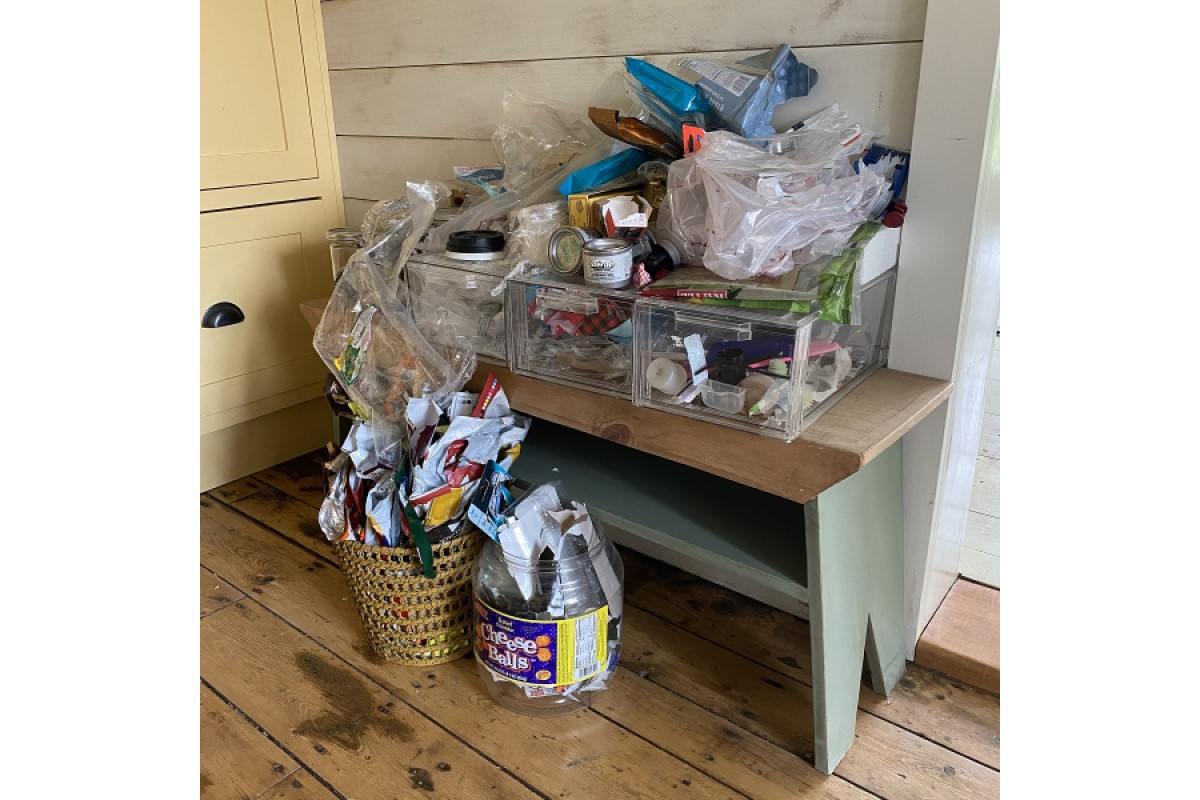
The Schaub’s sorted trash items.
"News Services" POPULAR ARTICLE
-

Japan’s Princess Kako Marks 31st Birthday, Contributed to Key Events This Year
-

Arctic Sees Unprecedented Heat as Climate Impacts Cascade
-

Brigitte Bardot, 1960s Sultry sex Symbol Turned Militant Animal Rights Activist Dies at 91
-

At Least 7 Explosions and Low-Flying Aircraft Are Heard in Venezuela’s Caracas
-
◎竹増ローソン社長インタビュー〔1〕_20251228YGTGS000198_C-250x166.jpg)
Convenience Store Chain Lawson May Start OTC Drug Delivery in 2026
JN ACCESS RANKING
-

Japan Govt Adopts Measures to Curb Mega Solar Power Plant Projects Amid Environmental Concerns
-

Core Inflation in Tokyo Slows in December but Stays above BOJ Target
-

Major Japan Firms’ Average Winter Bonus Tops ¥1 Mil.
-

Bank of Japan Considered U.S. Tariffs, Coming Shunto Wage Hike Talks in Its Decision to Raise Interest Rates
-

Tokyo Zoo Wolf Believed to Have Used Vegetation Growing on Wall to Climb, Escape; Animal Living Happily after Recapture






